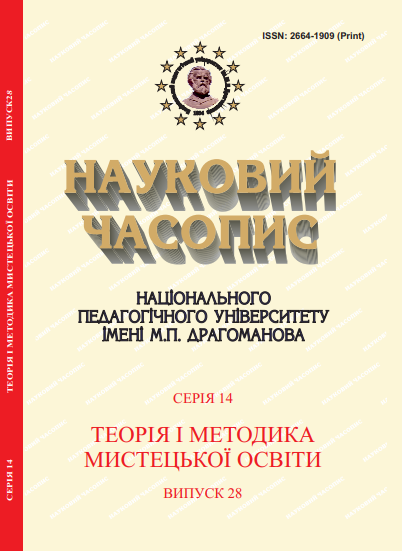Integrative and axiological construct in the practical work of students within professional training them as music teachers
DOI:
https://doi.org/10.31392/NPU-nc.series14.2022.28.04Keywords:
future teachers of musical art, integration and axiological construct, creative approach, creative and interpretive work with studentsAbstract
At the current stage of the development of art education, a student of a higher education institution must acquire a system of universal knowledge that will help him successfully adapt to the future job. Mastering professional skills of a future music teacher in relation to the European requirements of a higher school involves expanding the range of types of his professional activity. The structure of this pedagogical complex includes interrelated and interdependent related professions that a music teacher should embody. He must have the qualities of a didactic, methodologist, psychologist, musician-pedagogue and musician-performer, educator-mentor and others. The purpose of this publication is the theoretical and methodological substantiation of integrative technologies; and highlighting the features of the integration and axiological construct in the structure of training future music teachers to work with students. The article reveals the peculiarities of the integration and axiological construct of training students of arts faculties of pedagogical universities for practical work with students. The complexity and complex nature of professional tasks that must be solved by a modern specialist are shown, covering knowledge and skills from various branches of science for successfully mastering various types of cognitive and creative work with students. It is emphasized that the integration-axiological aspect of art education provides for the ability to comprehensively consolidate knowledge, synthesize it, transfer ideas and methods from one science to another, which provides future music teachers with a creative approach to artistic and musical education. From the standpoint of the interdisciplinary dimension, the transdisciplinary connections in the process of training students of the faculties of arts in the specialty "Musical Art" were analyzed. The results of training future music teachers for creative and interpretative work with students are highlighted.
References
Бех І.Д. (2018), Особистість на шляху до духовних цінностей: монографія. Київ-Чернівці: «Букрек». 320с.
Вітвицька С.С. (2015), Аксіологічний підхід до виховання особистості майбутнього вчителя. Креативна педагогіка. Наук.-метод. журнал. Академія міжнародного співробітництва з креативної педагогіки. Вінниця. Вип. 10. С. 63-67.
Гончаренко С.У. (2011), Український педагогічний енциклопедичний словник. Вид. 2-ге. - Рівне: Волинські обереги. 552 с.
Завалко К.В., Проворова Є.М. (2021), Самовдосконалення вчителя музики: інноваційно-праксеологічний підхід. Навчально-методичний посібник. К.: Центр навчальної літератури. 339 с.
Зязюн І.А., Сагач Г.М. (1997), Краса педагогічної дії: навч. посіб. для вчителів, аспірант., студ. К.: Українсько-фінський ін-т менеджменту і бізнесу, 1997. 302, [1] с.
Казиник М. Тайны гениев. М.: Новый Акрополь, 2011. С. 12-34.
Карташова Ж.Ю. (2010), Формування в студентів-музикантів готовності до інструментально-виконавської діяльності на основі інтегративного підходу. Збірник наукових праць. Педагогічна освіта: теорія і практика. Кам’янець-Подільський. Вип. 4. С. 293-300.
Козир А.В. (2008), Професійна майстерність учителів музики: теорія і практика формування в системі багаторівневої освіти: монографія. К.: НПУ імені М.Драгоманова. 378 с.
Козловська І.М. (1999), Теоретико-методологічні аспекти інтеграції знань учнів професійно-технічної школи (дидактичні основи). Львів : Світ, 1999. 301 с.
Костюк Г.С. (1989), Навчально-виховний процес і психічний розвиток особистості. К.: Рад. школа. 608 с.
Масол Л.М. (2006), Загальна мистецька освіта: теорія і практика: монографія. К.: Вид. «Промінь», 2006. 432с.
Орлов В.Ф. (2003), Професійне становлення вчителів мистецьких дисциплін: теорія і технологія: монографія за заг. ред. І.А.Зязюна. К.: Наукова думка. 262 с.
Падалка Г.М. (2008), Педагогіка мистецтва (теорія і методика викладання мистецьких дисциплін). Київ: Освіта України. 274 с.
Рудницька О.П. (2005), Педагогіка загальна та мистецька: навчальний посібник. Тернопіль: Навчальна книга Богдан. 360 с.
Сисоєва С.О. (1996), Підготовка вчителя до формування творчої особистості учня. К.: Поліграфкнига. 406 с.
Elliot J. (ed.) Reconstructing Teacher Education. (1993), London: Falmer Press, Р. 19-25.
Gunrt H. (2007), Personality structure and human interaction: the developing sunthesis of psychodynamis theory. Y: Intern Un. Pr. 456 p.
Kozyr A., Labunets V., Pankiv L., Liming W., Geyang Zh.: (2020), Methodological Aspects of Modernization of Professional Training of Future Music Teachers. Utopia y Praxis Latinoamericana. Revista Internacional de Filosofia y Teoria Social. Universidad del Zulia-Venezuela. Vol. 25. 2020. pp. 370-377.
Willoygby D. (1996), The World of Musik. Third ed. Boston: MacGraw-Hill. 381 р.
Downloads
Published
Issue
Section
License
Copyright (c) 2022 Nauk. čas. Nac. pedagogìčnogo unìv. ìm. M.P. Dragomanova, Ser. 14, Teor. metod. mistec. osv. [Scientific journal NPDU. Series 14. Theory and methodology of arts education]

This work is licensed under a Creative Commons Attribution-NonCommercial-NoDerivatives 4.0 International License.

